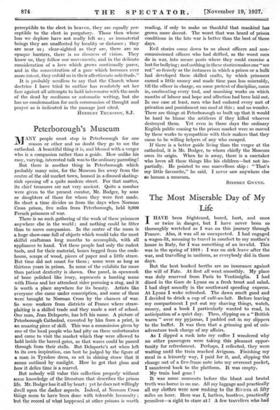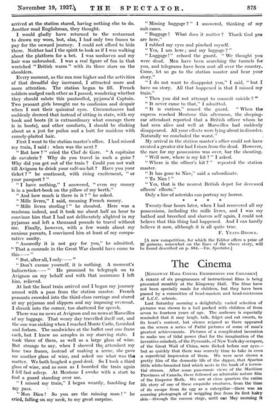The Most Miserable Day of My .Life
IHAVE been frightened, bored, hurt, and once or twice in danger, but I have never been so thoroughly wretched as I was on this journey through France. Also, it was all so unexpected. I had engaged a wagon-lit, meaning to travel in comfort to my mother's house in Italy, for I was something of an invalid. This was in the spring of 1919: I was on sick leave after the war, and travelling in uniform, as everybody did in those days.
But the best booked berths are no insurance against the will of Fate. At first all went smoothly. My place was duly reserved from Paris to Ventimiglia. I had dined in the Gare de Lyons on a fresh trout and salad. I had slept soundly in the southward speeding express. At Lyons I woke refreshed. The dawn smelt good and I decided to drink a cup of café-au-lait. Before leaving my compartment I put out my shaving things, watch, money, and a book I particularly wanted to read, in anticipation of a quiet day. Then, slipping on a "British warm " over my pyjamas, I padded out in my slippers to the buffet. It was then that a grinning god of mis- adventure took charge of my affairs.
As I dipped a rusk into my coffee I wondered why no other passengers were taking this pleasant oppor- tunity for refreshment. Perhaps, I reflected, they were waiting until the train reached Avignon. Finishing my meal in a leisurely way, I paid for it, and, slipping the change out of a five-franc note into my overcoat pocket, I sauntered back to the platform. It was empty.
My train had gone !
It was some moments before the blunt and brutal truth was borne in on me. All my luggage and practically all my clothes were now rushing to the Riviera at fifty miles an hour. Here was I, hatless, bootless, practically penniless—a sight to stare at I A few travellers who had arrived at the station stared, having nothing. else to do. Another mad Englishman, they thought.
I would gladly have returned to the restaurant to drown my woes, but, alas, I had only two francs to pay for the onward journey. I could not afford to hide there. Neither had I the spirit to look as if I was walking about the platform for a bet. I was unshaven and my hair was unbrushed. I was a real figure of fun in that wretched " British warm " with its three stars on the shoulders.
Every moment, as the sun rose higher and the activities of that dreadful day increased, I attracted more and more attention. The station began to fill. French soldiers nudged each other as I passed, wondering whether they should salute this pantoufled, pyjama'd Captain.
Two peasant girls brought me to confusion and despair when I met their quizzical eyes. Circumstances had suddenly decreed that instead of sitting in state, with my book and boots (it is extraordinary what courage there is in boots), and other comforts, I should be slinking about as a jest for poilus and a butt for maidens with comely-plaited hair.
First I went to the station master's office. I had missed my train, I said : when was the next ?
" But how ? " cried the Chef de Gare. " A capitaine de cavalerie ? Why do you travel in such a guise ?
Why did you get out of the train ? Could you not wait till Avignon to drink your café-au-lait ? Have you your ticket ? " he continued, with rising excitement, " or your passport " " I have nothing," I answered, " even my money is in a pocket-book on the pillow of my berth."
" And how much is there in it ? " he asked.
" Mille livres," I said, meaning French money.
" Mille livres sterling ! " he shouted. Here was a madman indeed, and it took me about half an hour to convince him that I had not deliberately alighted in my pyjamas and left a thousand pounds to travel without me. Finally, however, with a few words about my anxious parents, I convinced him at least of my compa- rative sanity.
" Assuredly it is not gay for you," he admitted. " That a comrade in the Great War should have come to this 7 " But, after all, I only " " Don't excuse yourself, it is nothing. A moment's indiscretion— " He promised to telegraph on to Avignon on my behalf and with that assurance I left him, relieved.
At last the local train arrived and 'I began my journey armed with a pass from the station master. French peasants crowded into the third-class carriage and stared at my pyjamas and slippers and my imposing overcoat. I shrank into the corner, too shattered for speech.
There was no news at Avignon and no news at Marseilles of my luggage. That weary day travelled itself out, and the sun was sinking when I reached Monte Carlo, famished and forlorn. The sandwiches at the buffet cost one franc each, but I knew no scruples in my starving state. I took three of them, as well as a large glass of wine.
But strange to say, when I showed the attendant my lone two francs, instead of making a scene, she gave me another glass of wine, and asked me what was the matter. We both laughed a good deal. So I took a third glass of wine, and 'as soon as I boarded the 'train again I fell fast asleep. At Mentone I awoke with a. start to find a guard standing over me.
" I missed my train," I began wearily, fumbling for my pas& " Mon -Dieu ! So you are the missing man ! " he cried, falling on my neck, to my great surprise. " Missing baggage ? " I answered, thinking of my suit-cases.
" Baggage ! What does it matter ? Thank God you are here."
I rubbed my eyes and pinched myself.
" Yes, I am here ; and my luggage ? "
" Luggage ! " echoed the guard. " We thought you were dead. Men have been searching the tunnels for you, and telegrams have been sent all over the country. Come, let us go to the station master and hear your story."
" I do not want to disappoint you," I said, " but I have no story. All that happened is that I missed my train."
" Then you did not attempt to commit suicide ? " " It never came to that," I admitted.
" It is curious," mused the guard. " When the express reached Mentone this afternoon, the sleeping- car attendant reported that a British officer whom he had seen alive and well at Marseilles had suddenly disappeared. All your effects were lying about in disorder. Naturally we concluded the worst."
My arrival in the station master's office could not have created a greater stir had I risen from the dead. However, the race for my possessions was over, bar the shouting.
" Well now, where is my kit ? " I asked.
" Where is the officer's kit ? " repeated the station master.
" It has gone to Nice," said a subordinate.
" To Nice " " Yes, that is the nearest British depot for deceased officers' effects."
Only a line of asterisks can portray my horror.
* * ** Twenty-four hours later, when I had recovered all my possessions, including the mile livres, and I was my bathed and breeched and shaven self again, I could not believe that this thing had happened. And I can hardly believe it now, although it is all quite true.
F. YEATS-BROWN.
[A new competition, for which the Editor offers a prize of 20 guineas, somewhat on the lines of the above story, will be found described on p. 884.—En. Spectator.]















































 Previous page
Previous page